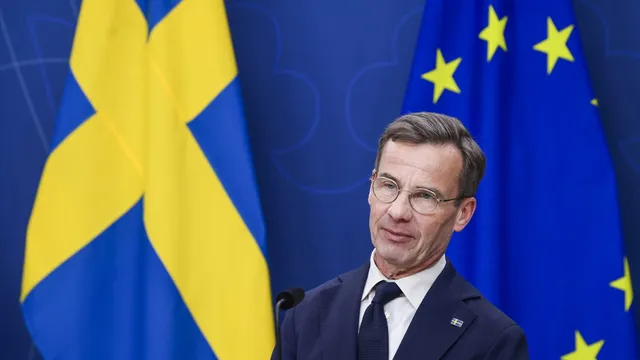
EU leaders meet in Brussels to discuss tightening migration policies
2024-10-17 19:10- Prime Minister Ulf Kristersson of Sweden advocates for stricter migration policies at the upcoming EU summit.
- The European Commission proposes measures to increase pressure on migrants without asylum rights to return to their countries.
- Poland plans to temporarily suspend asylum rights, highlighting the need for a reevaluation of asylum policies in light of geopolitical challenges.
Express your sentiment!
Insights
In Stockholm, Sweden, Prime Minister Ulf Kristersson emphasized the necessity of a strict migration policy ahead of the EU leaders' summit in Brussels scheduled for October 2024. He highlighted that such policies are crucial for addressing various pressing issues within Europe. The President of the European Commission, Ursula von der Leyen, has communicated with EU leaders, proposing legislative measures aimed at increasing pressure on migrants who do not qualify for asylum to return to their home countries. This initiative is a response to calls from several member states, including Sweden, for more stringent asylum policies. Poland has recently announced its intention to temporarily suspend the right to asylum, citing concerns over a hybrid attack from Russia and Belarus, which they claim is aimed at destabilizing the EU by sending migrants across their borders. This situation is expected to be a significant topic of discussion at the upcoming summit. Kristersson expressed understanding of Poland's position, suggesting that the right of asylum may need to be reevaluated in light of current geopolitical realities. He argued that the existing asylum framework is outdated and not equipped to handle the manipulation of migration by countries like Russia. The summit will likely address these complex issues, as member states seek to balance humanitarian obligations with national security concerns. The discussions may lead to significant changes in EU migration policy, reflecting the evolving geopolitical landscape and the challenges posed by external actors.
Contexts
As the European Union prepares to implement its new migration and asylum Pact in 2024, the landscape of migration policy is set for a significant transformation. However, the final agreement has raised concerns about its potential to exacerbate human rights violations at the EU's borders. Critics argue that the Pact may not alleviate the pressure on states of first entry, which have been overwhelmed by the influx of asylum seekers. The International Rescue Committee (IRC) has called for assurances from EU leaders that fundamental rights will be upheld, rather than eroded, as the new policies take effect. The Pact introduces several key regulations, including the Asylum and Migration Management Regulation (AMMR) and the Return Border Procedure Regulation, which aim to streamline asylum processes and establish solidarity measures among member states. Yet, the ongoing political polarization within the EU complicates efforts to reach a consensus on how to handle those seeking safety. With humanitarian needs at an all-time high, the urgency for a humane and orderly approach to migration has never been more critical. As the EU navigates these changes, it is essential that member states prioritize the dignity and rights of individuals seeking refuge. The Union Resettlement Framework (URF) is expected to play a crucial role in providing a structured way for refugees to enter the EU safely. Additionally, there is a pressing need to ensure dignified reception conditions, focusing on the specific needs of vulnerable populations, including access to healthcare and education. With the European elections approaching, migration is poised to be a pivotal issue. The outcome may influence the implementation of these reforms, as anti-immigration sentiments gain traction. As the EU grapples with these challenges, the future of its migration policy remains uncertain, with the potential for both progress and setbacks in the coming years.